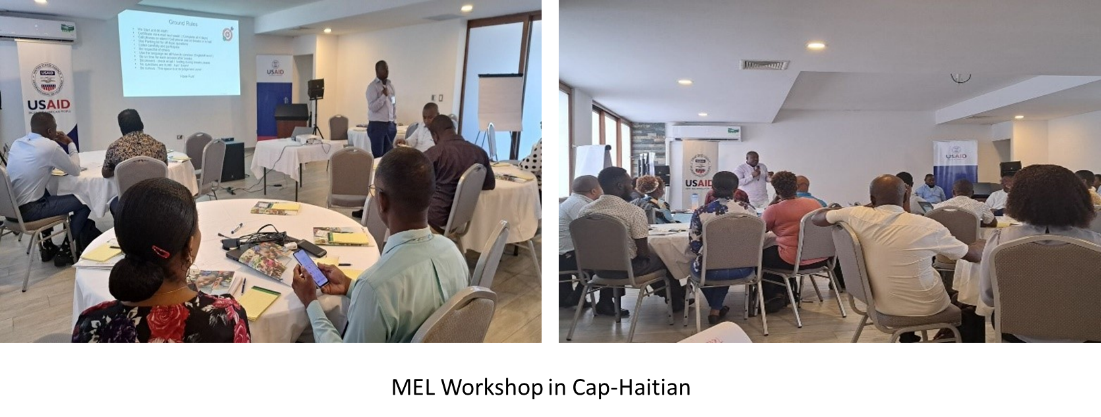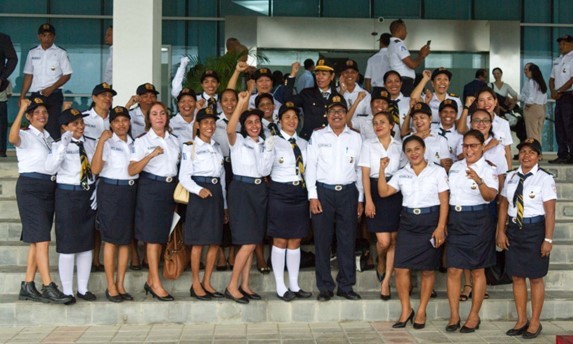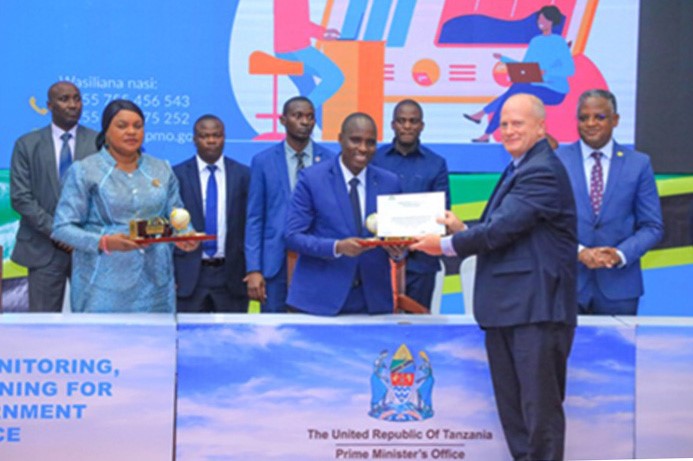By Daywe MacArthur, Project Associate, IBI
Navigating Shifting Realities and Capabilities in Development
In a post COVID-19 world, increased political and economic instabilities are shifting the dynamic global development landscape, ushering in new challenges and opportunities. This evolving terrain in which empowerment and strengthening capacity are integral prompts the development community to reimagine how we approach and participate in international development. At International Business Initiatives (IBI), we understand that change is inevitable, and mitigating risks in the face of uncertainties is crucial. Adopting adaptive management strategies that center intentionality allows IBI to navigate changes effectively with a commitment to sustainable development. The following strategies in the past year have assisted IBI in adapting to the shifting realities and addressing evolving landscapes.
Increasing Capacity
 MEL Workshop in Cap-Haitian
MEL Workshop in Cap-Haitian
Capacity becomes paramount, especially in conflict environments. In a world of increasing uncertainties, finding alternative solutions and leveraging technology are essential to adaptive management. Capacity strengthening of project staff and local partners is critical for on-demand support services, especially in non-permissive environments. IBI’s USAID/Haiti Evaluation and Survey Services – Plus (ESS+) Activity has been focusing on co-creation workshops and a Training-of-Trainer approach in which technical specialists train management personnel who, in turn, train their MEL specialists and points of contact. Training such as these and shared logistical and technical support workshops have deepened participants’ subject matter expertise, providing emerging MEL methods, practices, and tools. Co-creating solutions with local communities fosters trust, paving the way for impactful collaborations that trickle down to local economies.
Empowering Women in Economic Development

Custom Authority Commissioner Abilio with Custom Authority women staff at the Ministry of Finance flag-raising ceremony
Recognizing the marginalization of women and youth and focusing on gender and women’s economic development is imperative. Investing in women-owned enterprises, adapting strategies to support them, and providing equity are crucial steps in catalyzing positive change and addressing gaps in the market. As a women-owned small business, IBI recognizes the importance of continuing our commitment to supporting gender equity. Since the inception of the USAID/Timor-Leste Trade Governance Activity, the Activity has employed a full-time gender specialist to ensure gender equality and women’s empowerment remain at the core of the activities. As a result, the Activity team has made excellent progress throughout 2023 in building the confidence and skills of Customs Authority (CA) female staff and helping the CA and relevant trade and commerce groups to engage and connect with women traders. Recognizing the importance of establishing ongoing dialogue and engagement, the Activity team helped the CA to convene and attend over 100 different meetings with key stakeholders, including the SEII, AEMTL, CCI-TL, Christian Social Services Commission, Women’s Network, Civil Society Organizations, and Other Government Agencies to discuss how to promote women in trade and how to increase networking between government entities and women traders. The Activity team has also been helping the Timor-Leste Customs Authority to develop specific language intended to support and protect females and minority groups within two different Articles, which—once promulgated—will be codified into law.
Supporting the Next Generation of Development Professionals

USAID/Tanzania Mission Director received a certificate of appreciation from the Tanzanian Deputy Prime Minister for USAID’s contribution to the successful organization of the MEL Week 2023 forum.
Empowering the next generation involves acquiring tools to reach marginalized communities effectively. This includes youth and gender-specific approaches, context-specific analysis, building internal capacity, and fostering partnerships with diverse actors. The USAID/Tanzania Monitoring, Evaluation, Learning, and Adaptation Activity (T-MELA) assisted in the MEL Week 2023 forum to include young and emerging evaluators and researchers (YEE) from local research and MEL institutions via a bursary provided by USAID through their capacity-building intervention for local institutions under the USAID T-MELA framework. These participants orchestrated technical aspects, such as determining the key topics to be discussed and calling for and reviewing abstracts, paper publications, and presentations. Moreover, they enriched the forum’s content with diverse contributions, including keynote addresses. Over 22 members from Tanzanian youth organizations were actively involved in moderating sessions and presenting papers on M&E experiences and challenges within the country. A thought-provoking panel discussion on “Improving Evaluation Effectiveness and Utility through Gender Equality and Social Inclusion (GESI)” was presented, and insights into the status and future trajectory of MEL in Zanzibar were shared. The success of the 2nd National MEL Week reaffirmed the enduring positive influence of future MEL organizers in Tanzania. Their ongoing commitment to advancing M&E practices and using evidence for decision-making continues to shape the nation’s development agenda.
As IBI navigates shifting realities and capabilities, our commitment to sustainable change will drive constant learning, collaboration, and dedication to positively impacting the communities that IBI serves.





